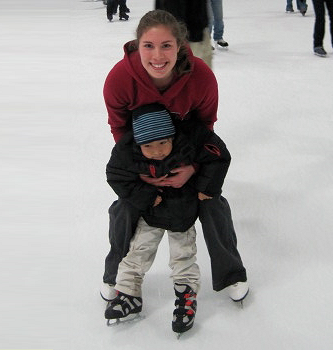
Sarah Tracy, SOM ’14, skates with Key Reh, a four-year boy from the refugee family that she mentors.
Photo credit: Mark O’Connor, SOM ’13
Nothing says “winter in New England” quite like ice skating. The minute lakes and ponds freeze over in December, skaters appear as if from nowhere and impromptu hockey games pop up wherever there are clear patches of ice and kids with sticks. Thanks to a group of student volunteers, some of Worcester’s newest residents were introduced to this quintessential regional activity, and as a result, possibly feel more at home in the their new environment.
Sarah Tracy, SOM ’14, volunteers with the Worcester Refugee Assistance Project—WRAP for short—as a mentor to a family of refugees from Burma who are settling into the small but growing refugee community in Worcester. Tracy is a lifelong New Englander—she grew up in Sturbridge and attended Amherst College as an undergrad. The refugee family she mentors includes five children, four of whom are old enough to skate. What started as an idea for a nice family outing soon blossomed into a volunteer project that her entire academic house—Quinsigamond House, one of five learning communities of the new Learner-Centered Integrated Curriculum—embraced.
“My boyfriend is a hockey player and the four boys in my refugee family are fascinated by hockey. I thought it would be nice to take the boys to one of the free skate times that the Buffone Arena on Lake Avenue offers on weekends,” said Tracy. When word of her plans spread to other kids and teens who use the WRAP Resource Center, many of them wanted in too. “There was a huge interest. Some kids had never heard of skating or had never seen it, so there was a lot of curiosity,” said Tracy.
Realizing she needed help when 28 kids from the WRAP community signed up, Tracy enlisted her fellow Quinsigamond House members and ended up with 17 volunteers, including friends and family, and other WRAP volunteers, in addition to the SOM students.
Tracy was also able to use $250 in house money to offset the cost of skate rentals and admission to the rink. “The house had earned $250 for reaching 80 percent participation in the LCME survey [a survey that UMMS conducts as part of their Liaison Committee on Medical Education reaccreditation process]. The money was set aside to be used for a worthy house project and everyone agreed through a vote that this was a great cause,” said Tracy. It helped that she accompanied her email plea with a photo of one of the kids who would get to skate. She also negotiated a discounted rate for admission to the Buffone Arena.
“Events such as these not only provide an opportunity to contribute to the larger community outside of UMass Medical School, but also enhance the sense of community among students within our newly formed house system,” said Dede Blake, MD, associate professor of pediatrics, who is one of four mentors for Quinsigamond House, where she is also head of house.
The afternoon of skating was a great success. Although the kids were wobbly at first, they caught on quickly and were skating well within two hours. The older boys in Tracy’s family even got to catch the first period of a college hockey game that started right after the free skate was over.
In addition to arranging for enriching activities for the children in the family that she mentors, Tracy helps the family navigate the complex American health care system. The grandparents of the five children are part of the household, in addition to the children’s mother and uncle. Tracy has been able to help arrange for the grandfather to get a new prosthetic leg and has also helped coordinate transportation and interpreter services for the family’s medical appointments.
For more information about WRAP or to volunteer or donate, visit the WRAP website.
|
Tracy is also co-coordinating a Family Health Night at the WRAP Resource Center, which will include five stations that will each address a health-related topic of concern to the members of the refugee community. The project is funded through an MLK Semester of Service Award that Tracy and GSBS student and fellow WRAP volunteer Nang Maung received as a result of a proposal they submitted to the Building on the Promise: Learn and Serve UMass Program. The Family Health Night, scheduled for April 22, empowers teens and young adults from Burma to become community leaders as they learn about health care and then partner with medical students to run the educational event for the Burmese refugees. Look for coverage of the event on UMassMedNow. |
Related links:
Student service projects supported by MLK Semester of Service program
GSN student helps refugees from Burma build lives in their new country
Learn and Serve Grant helps student make a difference